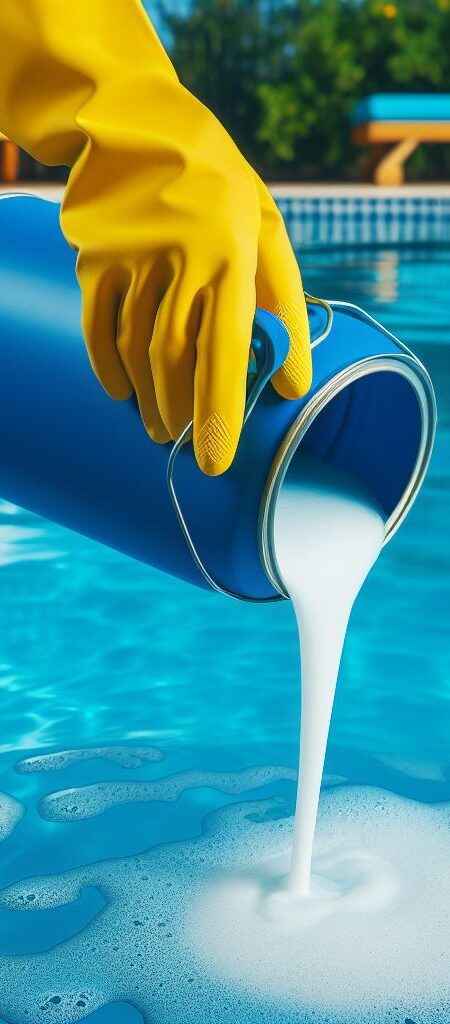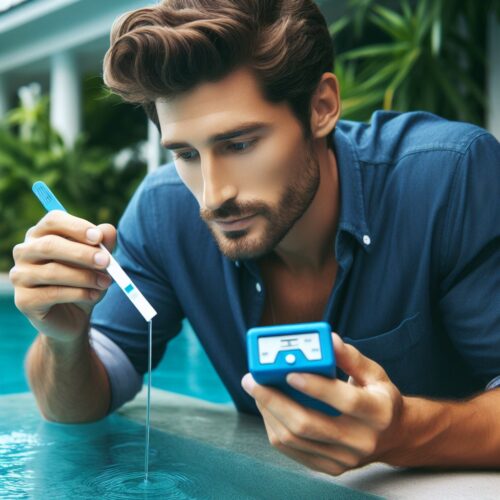How Often Should You Be Testing Your Pool Water?
Maintaining a swimming pool is a labor of love. It’s an investment that rewards you with hours of leisure and the splendid refreshment of a cool, crystal-clear oasis.
Yet, like any cherished asset, a pool requires maintenance to keep it safe, hygienic, and operational. Central to this care is the regular testing of your pool water’s chemistry.
If you’re wondering, “How often should I be testing my pool water?” you’re in the right place.
Let’s dive into the reasons why testing your pool water is imperative, guidelines for how frequently you should perform these tests, and essential troubleshooting tips to keep your pool in perfect splashing condition.
Testing: A Critical Aspect of Pool Maintenance
As serene as your pool water may appear, it’s a deceivingly complex brew of chemicals and environmental influences.
The balance of these elements not only affects the water’s clarity but also plays a pivotal role in safety and lifespan.
Regular testing lets you stay ahead, identifying issues before they blossom into costly problems.
Why Testing is Necessary
Proper testing of pool water offers a litmus for several critical components: pH level, alkalinity, and sanitizer concentrations. Here’s why each of these tests is vital:
- Maintaining Water Balance: Your pool water is seeking equilibrium. If pH or alkalinity levels stray, they can corrode your pool’s surfaces or lead to scaling.
- Ensuring Sanitizer Levels: Chlorine and other sanitizers combat bacteria and preserve water quality. If levels are inadequate, your pool can harbor harmful pathogens.
- Preventing Algae Growth: Algae love an imbalanced or sanitizer-poor environment. Regular testing can help nip algae issues in the bud.
- Protecting Equipment: Corrosive or scaling water conditions can wreak havoc on your pool’s mechanical components, from filters to heaters.
Get A Total Pool & Hot Tub Course Bundle!Get all four pool and hot tub courses including The Pool Care Video Course, The Hot Tub Video Course, Money-Saving Guide for Pool Owners, and the Pool Winterization Course for one low price!
Factors that Affect Test Frequency
The frequency of testing needed for your pool water isn’t set in stone. Various factors can accelerate the need for testing, including:
- Pool Usage: The more your pool is enjoyed, the more it disrupts water balance and depletes sanitizer levels.
- Weather Conditions: Extreme heat and rain dilute water chemistry, demanding more frequent checks.
- Chemical Treatments: Often the solution becomes the problem. The application of chemicals for maintenance or problem-solving should be followed with testing.
Recommended Testing Schedule
Testing your pool water regularly is crucial for maintaining a safe and balanced swimming environment.
In general, it is recommended to test the water at least two to three times per week, ensuring prompt identification and resolution of any chemical imbalances.
Factors such as heavy pool usage, hot weather, rainfall, and the pool’s initial filling may necessitate more frequent testing.
Additionally, electronic monitoring systems can offer continuous water quality assessment, providing timely alerts for necessary adjustments.
Consistent testing helps optimize pH, chlorine levels, alkalinity, and calcium hardness, ensuring a pristine and enjoyable swimming experience for all.
Routine Testing
On a weekly basis, you should test pH and sanitizer levels, as well as the pool’s alkalinity and calcium hardness levels.
If your pool sees heavy usage or encounters significant weather, consider bi-weekly or even daily monitoring during such periods.
Tailoring Test Frequency
It is suggested that customizing your pool testing routine might be more beneficial than just performing weekly tests.
To personalize your testing plan, keep a record of your pool’s performance and water quality.
Take into account factors such as the size of the pool, the amount of sun or wind exposure, and the type of chlorination system you use. This will help you adapt your testing plan accordingly.
Understanding and Acting on Test Results
What good is testing if you don’t understand what the data means?
Let’s break down the ideal parameters you should aim for and actions to take if your readings are amiss.
Find All The Pool Chemicals You Need On Our Amazon Storefront!
Ideal Ranges for Different Parameters
Your pool water should generally exhibit:
- A pH between 7.4 and 7.6
- Alkalinity within 80-120 ppm (parts per million)
- Chlorine levels ranging from 1 to 3 ppm
- Calcium hardness between 200 and 400 ppm
Test Kit Measurements
Familiarize yourself with the specific instructions and measurements of your test kit.
Simple missteps, like miscounting the drops or setting a timer incorrectly, can lead to misleading results.
Troubleshooting Common Issues
Even with the most judicious testing and care, pools can encounter problems.
Learn to recognize signs of water woes and remedies to rectify them.
Addressing Imbalances in Water Chemistry
If you find your chemistry out of whack, you can balance pH with chemicals like soda ash or muriatic acid, and employ baking soda for alkalinity adjustments.
Always add chemicals slowly and retest after a few hours to allow for proper distribution.
Treating Algae Outbreaks
Fighting an algae bloom may require “shocking” your pool, which dramatically spikes chlorine levels.
A consistent sanitizing routine, proactively tied to your test results, can help avoid this situation.
Fixing Equipment Problems
Problems like cloudy water or ineffective filtration can often be traced back to equipment issues. Regular testing can reveal imbalances that could indicate a malfunctioning component.
Ensuring a Clean and Safe Pool Experience
In conclusion, testing your pool water is an essential step in ensuring the longevity and hygienic state of your aquatic gem.
A consistent routine, informed by an understanding of why and how to test, can save you from undue expenses and disappointments.
By dedicating a slice of your poolside time to this critical task, you provide the vital care your pool deserves, perpetuating endless days of aqueous enjoyment.
As a pool owner, custodian, and connoisseur, remember that beneath the glistening surface lies an ecosystem beholden to your stewardship.
And with regular and consistent attention to its chemical composition, that ecosystem will flourish — not with algae, but with the joy and serenity only a well-maintained pool can offer.
Embrace the role of pool chemist with vigor, and may your waters be ever-clear!
I appreciate your time and interest in understanding how to maintain a clean and healthy pool.
Your diligence in pool care will undoubtedly prevent algae outbreaks and provide an enjoyable swimming experience.
Do you have any specific questions or concerns about your pool maintenance routine that you’d like us to address in future posts? Leave your comments and let’s keep the conversation going!
“Full transparency: Our website features affiliate links. If you make a purchase through these links, we’ll earn a modest commission at no additional cost to you. This is an effortless way to support our commitment to delivering top-notch content.”



